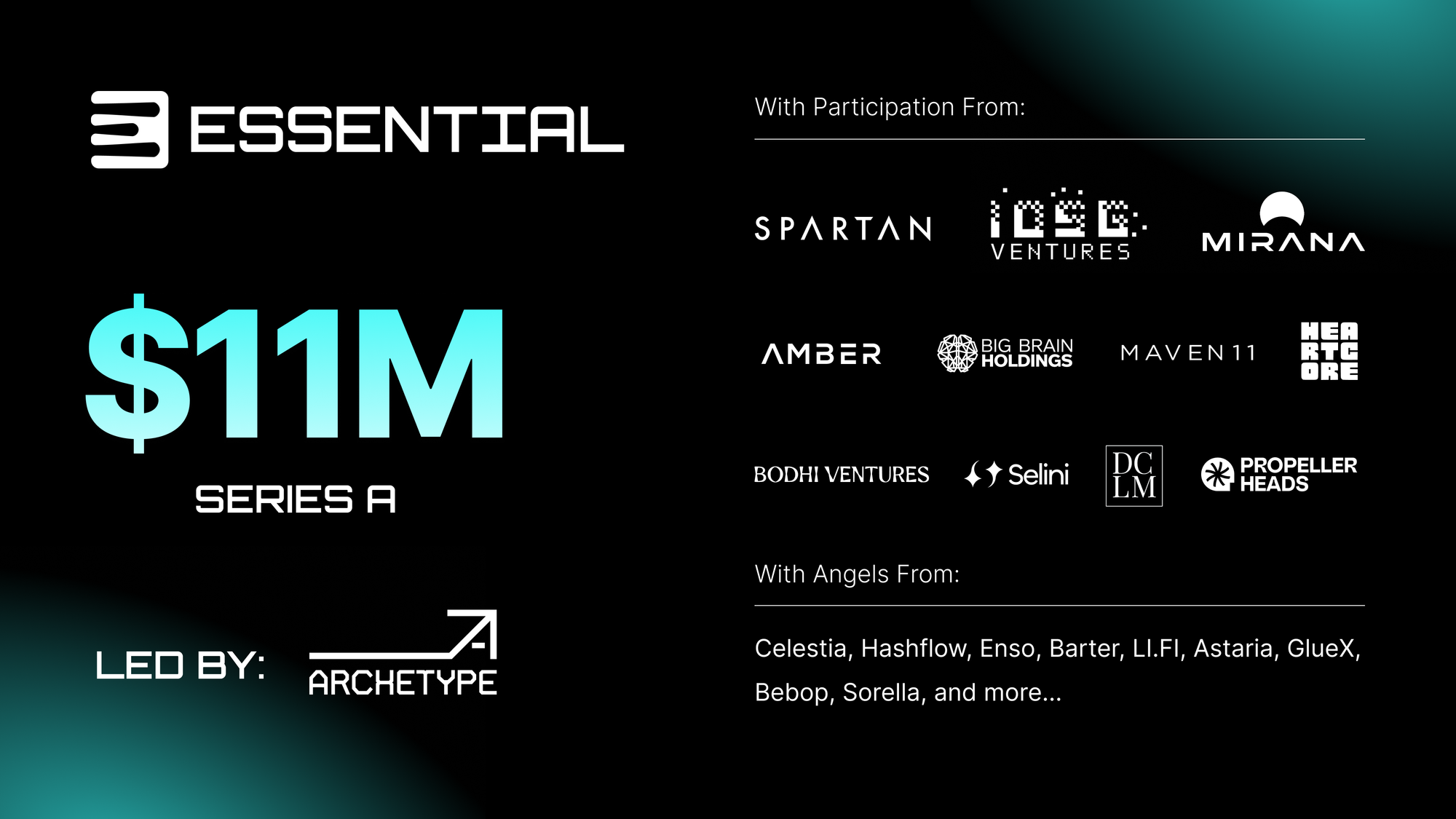Announcing Essential's $11M Series A Round

We’re excited to announce that we’ve secured $11M in Series A funding led by Archetype, with participation from IOSG, Spartan, Mirana, Amber Group, Maven 11, Bodhi Ventures, Big Brain Holdings, Heartcore Capital, Selini, DCLM, and PropellerHeads - alongside founders and angel investors from Celestia, Hashflow, Enso, Barter, LI.FI, Astaria, GlueX, Bebop, Sorella, and others.
This capital raise will help us accelerate our development of Essential — the first declarative blockchain — marking a major milestone for web3’s transition to a declarative, intent-based future.
“By enabling consensus on state updates without requiring on-chain execution, Essential will empower developers to build much more sophisticated and scalable applications than what is currently possible on virtual machine-based chains with traditional gas metering. We are incredibly excited to work alongside Liesl, Simon, and the entire Essential team as they design a chain from first principles with intents as the core primitive and design pattern.”
— Dmitriy Berenzon, Partner at Archetype
Understanding Essential's Declarative Model
Essential is the first declarative blockchain. At its core, the declarative approach involves reframing interactions in terms of outcomes, rather than instructions. This is in contrast with the imperative approach.
- Imperative - Always follow the instructions, regardless of the outcome.
- Declarative - Always output a valid outcome, without the need for instructions.
Learn more about declarative vs. imperative approaches:

The traditional imperative approach to blockchain design relies on transaction-based interactions, where state is updated by executing specific instructions on-chain. This model leads to excessive on-chain computation, scalability limitations, vulnerable applications and a cumbersome user experience. In fact, the most common UX complaints about blockchains—uncertain outcomes, failed transactions, MEV, high slippage—are actually criticisms of the underlying imperative architecture.
In contrast, declarative blockchains leverage constraints to achieve state updates without the need for execution. This executionless property is not the only benefit; because declarative blockchains enable users to directly constrain state, no state transition may be included if it does not achieve the user’s intended outcome. These properties lead to many benefits for users, developers, and the industry at large:

Empowering Developers with the Pint Language
At the heart of our declarative architecture is Pint, a constraint-based language for programmable intents. Pint allows application developers to directly constrain state on the Essential blockchain, opening up unprecedented possibilities for building sophisticated and scalable applications.
With the release of our pre-alpha devnet and developer documentation, we invite smart contract developers to experiment in this new declarative environment. The pre-alpha devnet, with Pint as a core building block, provides a playground for early builders to permissionlessly deploy and test declarative applications. The concept of an executionless blockchain design is now a practical reality that developers can begin working with today.
Leading the Charge Towards a Declarative Future
Our journey is just beginning. With the support of our investors and the growing interest in declarative principles, Essential is poised to lead the next wave of blockchain innovation.
Developers can get started by deploying and testing declarative applications on the Essential pre-alpha devnet, exploring the Pint repo, and diving into our developer docs.
The Essential community is growing, and we invite everyone to innovate within this new paradigm. We believe that declarative blockchains are the future of web3. Join us on our journey.
Sign up to stay updated 👇


